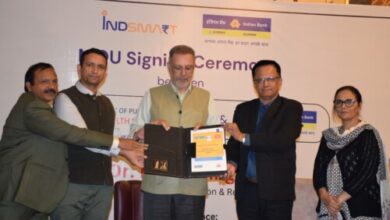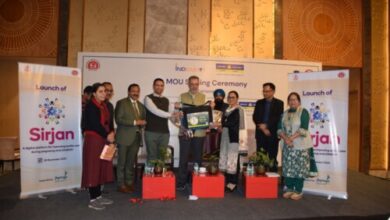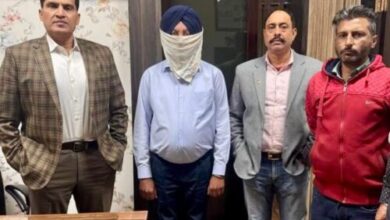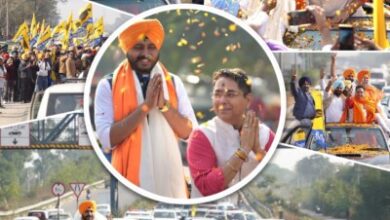PUNJAB CM TAKES KERJRIWAL HEAD ON OVER FAILURE TO PROVIDE FREE POWER TO DELHI FARMERS

PUNJAB CM TAKES KERJRIWAL HEAD ON OVER FAILURE TO PROVIDE FREE POWER TO DELHI FARMERS
TERMS DELHI POWER TARIFF STRUCTURE ORGANISED LOOT FOR FILLING POCKETS OF BIG DISCOMS LIKE RELIANCE
SAYS DELHI CITIZEN PAYING HIGHER AVERAGE PRICE FOR POWER THAN PUNJAB’S
Chandigarh, July 5:
Taking his Delhi counterpart head on for failing to provide free power to the farmers in the national capital, Punjab Chief Minister Captain Amarinder Singh on Monday slammed Arvind Kejriwal for making false promises on free power in Punjab with an
eye on the 2022 Assembly polls.
The Kejriwal government has completely failed the people of Delhi on all counts, with no free power to the farmers in the villages located in the national capital and excessively high power tariffs for the industry, said Captain Amarinder, declaring that the people of Punjab have already rejected the pathetic Delhi model of governance on all counts.
The Punjab Chief Minister termed the Delhi power tariff structure a case of organized loot by the Kejriwal-led Aam Aadmi Party (AAP) government, which was openly allowing private power distribution companies in Delhi, including the Reliance Group, to fill their pockets by collecting excessively high tariffs at the cost of the common man.
While Delhi is charging Rs. 9.80 per unit for industrial power, the Congress Government in Punjab is levying a subsidized tariff of Rs. 5 per unit to attract industry to Punjab, which has witnessed more than Rs. 85,000 crore worth of investment visible on the ground in the last 4 years. Subsidised power is currently being given to 1,43,812 industrial units in Punjab with an annual subsidy of Rs. 2226 crore, he pointed out, slamming Kejriwal over the latter’s recent
In sharp contrast to Punjab, where his government was giving free power worth Rs. 6,735 crore to 13,79,217 farmers, the AAP government in Delhi had made no effort whatsoever to extend similar support to the agricultural community there, said the Chief Minister. Pointing out that the Kejriwal government was among the first to notify one of the anti-farmer Farm Laws of the Centre in Delhi, he slammed AAP for pretending sympathy for the farmers of Punjab.
Exposing the anti-people power tariff structure of Delhi, Captain Amarinder said
the Delhi Government was befooling the people by putting a small amount into one pocket, by way of 200 units of free domestic power, and taking away a higher amount from the other pocket by way of the high tariffs being paid by the shopkeepers, industry and farmers for commercial and agriculture power. The Delhi Government was charging Rs. 11.34 per unit from small shopkeepers and other commercial establishments, which was 50% higher than what was being charged in Punjab, he said. In fact, he said, every resident of Delhi was indirectly paying much more for power than what was being paid by residents of Punjab.
Comparing the subsidies of the two states, the Chief Minister said that the Punjab Government is paying an annual power subsidy bill of 10,458 Crore while the Kejriwal government is paying Rs. 2820 Crore, when the population of Delhi was a mere 2 crore compared with Punjab’s 3 crore. This translates into average power subsidy in Punjab at Rs. 3,486 per person, as against Rs. 1410 for a Delhi resident.
Further, pointed out Captain Amarinder, the Punjab government is giving subsidized power amounting to Rs 10,458 crore, which is 2.24% of its total revenues, while the Delhi Government has provided a subsidy of Rs. 2,820 crore, which is only 1.03 % of its total revenues.
The situation, said the Punjab Chief Minister, was even more damning when seen in the context of the revenue generated through sale of power to the consumers. During the year 2020-21, PSPCL sold 46,713 MW of power whereas the distribution companies in Delhi sold 27,436 MW of power. Total revenue earned through sale of power was Rs. 29,903 crore in Punjab and Rs. 20,556 crore in Delhi. As a result the average cost per unit of power in Punjab comes to Rs. 6.40 where as it is Rs. 7.49 in Delhi, he pointed out.




